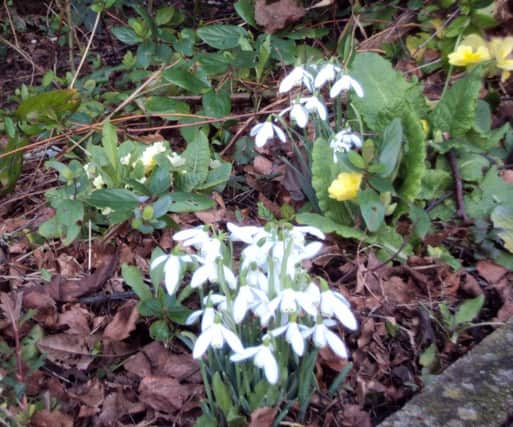Spring seems to have finally arrived


When we planted the orchard with fruit trees and herbs we also planted some snowdrops, primroses and daffodils.
Last year I spoke about our Bee World areas and snowdrops, primroses and crocuses are really good bulbs to plant for early foraging bees.
Advertisement
Hide AdAdvertisement
Hide AdI planted the traditional native varieties, as these are much better for bees.
These were available for purchase from the organiccatalogue.com website, but not until October now.
However, there are lots of other bulbs and plants which can be planted to help bees. Go to the Friends of the Earth website foe.org.uk to find out more.
What’s more, spring is the perfect time to sow some wild flower seed, either in your back garden.
Advertisement
Hide AdAdvertisement
Hide AdFor a source of wild flower seeds that can be sown now, go to the Kew Gardens’ Grow Wild project. You can find out more about this by visiting growwilduk.com.
Remember, water is also important for bees as well as the birds.
That being said, I do have a word of caution to issue about plants.
Friends of the Earth has found that some seedlings and plants for sale in garden centres and elsewhere have been sprayed with pesticides that are harmful to bees, especially ones called neonicotinoids.
Advertisement
Hide AdAdvertisement
Hide AdThe label may even say it is a good plant for bees, but if it has been sprayed with these chemicals it will harm the bees, rather than help them.
The answer is to grow your own plants from seed, or buy seedlings and plants from an organic grower.
We have been busy here at the orchard; volunteers have worked hard constructing the new compost bins which have been made out of chestnut wood and completing the winter pruning of our fruit trees and bushes.
It is important to remember that stone fruit trees such as peach, plum and cherry are not pruned in the winter as they can get a disease called silver leaf disease.
Advertisement
Hide AdAdvertisement
Hide AdSilver leaf disease is a fungal disease that has a tendency to attack plants in the rose family, but can also spread – the silver shine to some leaves is a big giveaway.
If you are interested in learning more about how to grow your own food, or are interested in volunteering to help look after the orchard, then please pop into the Stacey Orchard on a Wednesday morning between 10am and 1pm.
To contact the Stacey Centre please call (023) 9261 7890.